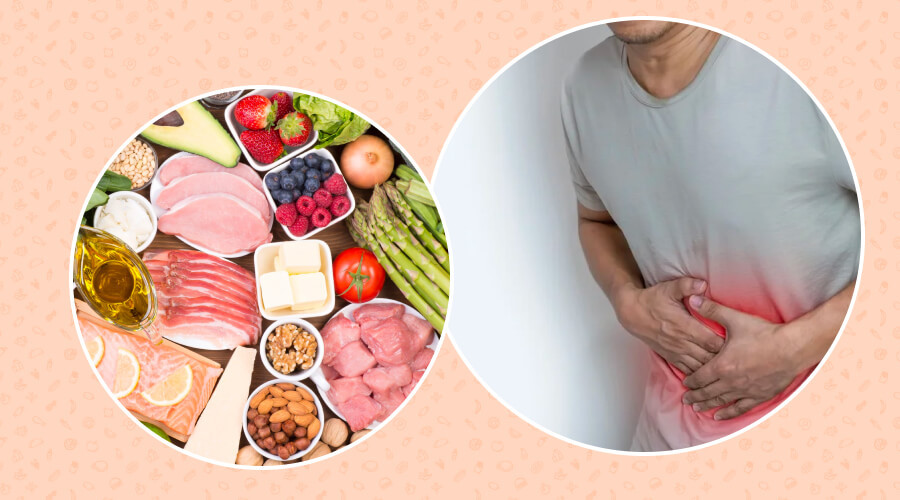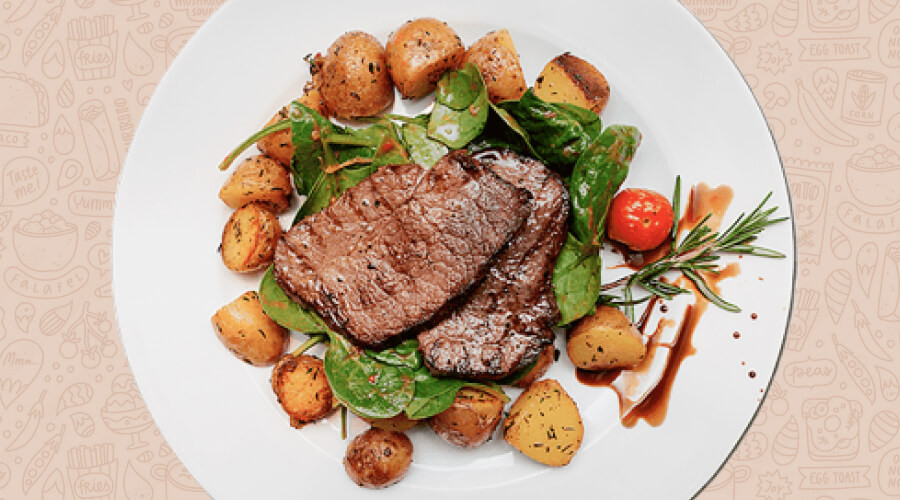For many healthy people, a high-protein diet can be beneficial. By increasing satiety and maintaining a sense of fullness, this dietary pattern can help a person consume fewer calories, lose weight, and build muscle.
While the high-protein diet may lead to certain health benefits, it is also linked to various risks and side effects, especially if you carry out this diet for a long time.
Continue reading to explore the possible adverse effects of a high-protein diet and how you can tell if you are eating too much protein.
What are the Possible Side Effects and Risks of a High-Protein Diet?

Like most other diets, the high-protein diet has associated risks and side effects. This diet is relatively safe for healthy adults, but you may experience the following side effects while on a high-protein diet.
Constipation
As proteins are very satiating, a high protein intake might cause you to eat less of other important nutrients, such as carbs. Fibre is a form of carbohydrate, so a lower carb intake could mean that you’re also consuming less fibre.
When you do not get enough fibre in your diet, you run the risk of constipation. In fact, some research has found that participants on a high-protein diet reported constipation more often [1].
It’s important to ensure that you get enough fibre while on this diet. One way to do this is to focus on protein-rich foods that are also packed with fibre. These include pistachios, almonds, pumpkin seeds, chia seeds, legumes, quinoa, and certain high-protein veggies like broccoli and mushrooms.
Diarrhoea
While a high-protein diet can cause constipation, it might lead to diarrhoea in other cases. Consuming a high amount of dairy products and processed meats on a high-protein diet could contribute to symptoms of diarrhoea, especially if you are lactose intolerant.
Some ways to prevent or reduce symptoms of diarrhoea while on a high-protein diet include the following:
- Drink plenty of water and stay well-hydrated
- Avoid foods high in saturated fats, fried foods, or highly-processed meats
- Avoid caffeinated beverages, such as coffee
- Ensure you consume enough fibre
Dehydration
Some research shows that a high-protein diet can reduce hydration levels. When your protein intake increases, this also leads to a rise in urea and other nitrogenous wastes that need to be excreted from the body [2].
As a result, you’d likely have to drink more water to prevent dehydration, whether you feel thirsty or not [2]. This is especially important if you are an athlete or lead a very active lifestyle.
Bad breath
Eating a high amount of protein could lead to bad breath.
Some research suggests that a diet rich in proteins can increase the amount of ammonia in the blood and saliva. As a result, this can increase the concentration of breath ammonia [3].
This produces an odour that can be very unpleasant and is often described as a “fishy” smell or similar to that of urine.
Unexplained fatigue
Eating a high-protein diet that’s also low-carb might lead to tiredness and low energy levels during the initial phases of the diet. That’s because carbohydrates are more efficiently converted to energy than other macronutrients like protein and fat.
If you’re going to go on a high-protein diet, don’t neglect your intake of carbs and fibre. Whole grains, fruits, and vegetables are all healthy sources of carbs and fibre to add to your high-protein diet.
Increased risk of heart disease
Researchers have found that a higher intake of red meat and processed meat can increase the risk of coronary heart disease, which refers to heart problems caused by the narrowing of the arteries supplying blood to the heart [4]. This might be due to the high saturated fat content in red meat and the high sodium content in processed meats.
If you wish to adopt a high-protein diet, it’s important that the foods you pick are heart-healthy and low in saturated fats.
According to the Heart Foundation, legumes (like chickpeas, lentils, and beans), nuts, seeds, seafood, and fish are some of the healthiest and most beneficial protein sources. Poultry and eggs do not increase your risk of heart disease, either [5].
Aside from that, you should limit your consumption of red meats to 350 grams a week. It’s also best to avoid processed meats [5].
Kidney Damage
A high-protein diet is generally considered safe for the kidneys in healthy adults. However, it could potentially increase the risk of further kidney damage in those who already have kidney disease [6]. That’s because damaged kidneys have to work even harder to get rid of the waste products from protein metabolism.
Some research also suggests that animal proteins are more likely to be associated with kidney disease compared to plant proteins [6].
Apart from this, researchers have discovered that a low intake of fluids and excessive protein consumption are key risk factors for the formation of kidney stones [7].
Can a High-Protein Diet Affect Health?
There are debates about the effects of a high-protein diet on bone health.
Research currently shows that high-protein diets are linked to greater bone mass and fewer fracture episodes when a person also consumes adequate calcium [8].
In contrast, a low-protein diet can lead to the release of calcium from the bones. In the long run, this may lead to increased bone loss and lower bone density [9].
Essentially, protein is thought to play a crucial role in preventing bone loss and slowing down the development of osteoporosis, a disease characterized by weakened bones [10].
Who Should Avoid a High-Protein Diet?
A high-protein diet is generally safe for healthy individuals when followed in the short term. Of course, this also depends on the quality and type of proteins you consume.
A high-protein diet may be unsafe for those with chronic health conditions, such as kidney disease.
Besides that, some research suggests that a high-protein diet could be weakly associated with pre-term birth, which poses a risk for pregnant mothers [11].
Studies have also found that a high-protein diet may interact with certain drugs. According to research, protein-rich meals may alter the absorption and metabolism of some medications, including certain high-blood pressure medications and antibiotics [12].
If you have any medical conditions or you’re pregnant, it’s best to seek the advice of your dietitian, nutritionist, or healthcare professional before making significant changes to your diet.
How Much Protein is Too Much?
In general, if you’re keen on adopting a high-protein diet, a good place to start is by consuming enough proteins each day to meet 20-25% of your total energy requirements.

One gram of protein delivers around four calories. So, a 2000-calorie high-protein diet generally calls for 100 grams of protein each day.
You can also calculate your protein intake goals by using your body weight. The minimum recommended amount of protein to consume per day is 0.8 grams of protein per kilogram of body weight. However, you may consume up to 1.6 grams of protein per day to reap the benefits of a high-protein diet.
So, if you weigh 65kg, a high-protein diet may look like consuming 100 grams of protein each day.
For the average healthy individual, it’s best to stay within 2 grams/kg/day. Eating more than this amount for a long time might lead to health problems.
If you need help determining what’s a safe amount of protein to consume, it’s best to seek the advice of your healthcare provider.
A high-protein diet is generally considered safe for a healthy adult. However, protein overconsumption can lead to weight gain, bad breath, constipation, and other adverse effects.
In general, healthy adults may safely consume up to 2 grams of protein/kg/day in the long haul. Of course, it’s still best to seek the advice of a medical professional if you’re planning to make significant alterations to your diet.
If you’re looking for more tips on starting a high-protein diet, check out our beginner’s guide to a high-protein diet.
Explore in more detail
- A Beginner’s Guide to the High-Protein Diet
- Best High-Protein Snacks for Weight Loss, Muscle Gain, & Satiety
- Highest Protein Vegetables
- Top High-Protein Meal Plans for a High-Protein Diet
- High-Protein Diet Tips for Beginners
- 10 Cheap Ways to Add Protein to Your Breakfast
- High-Protein Diet for Weight Loss: What Does Research Say?
- High Protein Foods for Muscle Gain and Weight Loss
